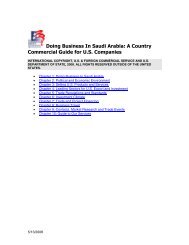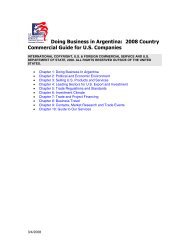Doing Business In (Insert Country Name Here) - BNA
Doing Business In (Insert Country Name Here) - BNA
Doing Business In (Insert Country Name Here) - BNA
You also want an ePaper? Increase the reach of your titles
YUMPU automatically turns print PDFs into web optimized ePapers that Google loves.
Key Link: [http://eurlex.europa.eu/LexUriServ/site/en/oj/2001/c_368/c_36820011222en00130015.pdf]<br />
The EU also seeks to combat payment delays with Directive 2000/35/EC. This covers all<br />
commercial transactions within the EU, whether in the public or private sector, primarily<br />
dealing with the consequences of late payment. Transactions with consumers, however,<br />
do not fall within the scope of this Directive. <strong>In</strong> sum, the Directive entitles a seller who<br />
does not receive payment for goods/services within 30-60 days of the payment deadline<br />
to collect interest (at a rate of 7 percent above the European Central Bank rate) as<br />
compensation. The seller may also retain the title to goods until payment is completed<br />
and may claim full compensation for all recovery costs.<br />
Key Link: [http://ec.europa.eu/comm/enterprise/regulation/late_payments/]<br />
Companies’ agents and distributors can take advantage of the European Ombudsman<br />
when victim of inefficient management by a EU institution or body. Complaints can be<br />
made to the European Ombudsman only by businesses and other bodies with registered<br />
offices in the EU. The Ombudsman can act upon these complaints by investigating<br />
cases in which EU institutions fail to act in accordance with the law, fail to respect the<br />
principles of good administration, or violate fundamental rights.<br />
Key Link: [http://www.ombudsman.europa.eu]<br />
Considering the host of distribution options available in France, the exporter must<br />
carefully select the method best suited to his or her product. French buyers generally<br />
prefer to purchase through an intermediary, making sales directly to the end-user<br />
uncommon. However, sales of expensive, technically sophisticated goods are an<br />
exception to this rule.<br />
<strong>In</strong>termediaries may take one of three primary forms under French law:<br />
• Distributor<br />
• Agent<br />
• Salaried Representative<br />
Distributor:<br />
A distributor (concessionnaire) is an individual or legal entity who purchases goods<br />
directly from a producer for the purpose of resale. The distributor operates<br />
independently and is only bound by the written provisions of the distribution agreement.<br />
These agreements, however, are subject to specific rules and regulations regarding<br />
exclusive distribution and price setting.<br />
Contract termination conditions are important, and vary with the type of distribution<br />
agreement. Either party without prior notification or indemnification may terminate a<br />
distribution agreement of specified duration at the end of the contract period. If the<br />
termination takes place before the end of the contract period, the terminating party may<br />
be sued for breach of contract.<br />
Either party may terminate a distribution agreement with an unspecified duration without<br />
indemnification after a fair notice period, usually six months. Termination by the supplier<br />
without fair notice may be grounds for damage claims by the distributor.<br />
2/15/2008 <strong>Country</strong> Commercial Guide for France 7<br />
INTERNATIONAL COPYRIGHT, U.S. & FOREIGN COMMERCIAL SERVICE AND U.S. DEPARTMENT OF STATE,<br />
© 2007. ALL RIGHTS RESERVED OUTSIDE OF THE UNITED STATES.












